come的详细用法
come的用法和固定搭配造句 (2)

come的用法和固定搭配造句一、come的基本用法come是一个常见的动词,在英语中有多种不同的含义和用法。
以下是对于come的基本用法进行说明:1. 表示到达或来自某处Come可以用来表示人或物从一个地方到达另一个地方,或者指明来源。
例句:- I came to the party late last night.(昨晚我很晚才到派对。
)- The book comes from a library in New York.(这本书来自纽约的一家图书馆。
)2. 表示出现某种状态或情况Come也可以描述某种状态或情况的出现。
例句:- Winter has come, and it's getting colder day by day.(冬天已经来临,天气变得越来越冷。
)- A feeling of happiness came over me when I saw her smile.(当我看到她微笑时,一股幸福感涌上心头。
)3. 表示时间顺序Come可以用于表示事件、事实或情况发生的顺序。
例句:- She finished high school, then came college and finally her career.(她完成了高中学业,然后进入大学,最后开始了职业生涯。
)- First comes love, then comes marriage, then comes the baby in the baby carriage.(先是爱情,接着是婚姻,然后才是婴儿推车里的孩子。
)二、come的固定搭配及造句除了基本用法外,come还有一些常见的固定搭配,下面将介绍其中几个,并给出相应的造句示例:1. come up with意思:提出,想出例句:- It took me a while, but I finally came up with a solution to the problem.(我花了一些时间,但最终我想出了一个解决办法。
come的用法及短语
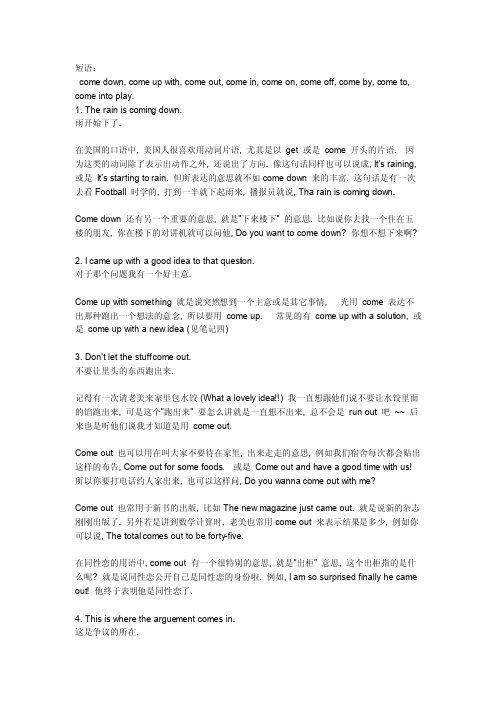
短语:come down, come up with, come out, come in, come on, come off, come by, come to, come into play.1. The rain is coming down.雨开始下了.在美国的口语中, 美国人很喜欢用动词片语, 尤其是以get 或是come 开头的片语.因为这类的动词除了表示出动作之外, 还说出了方向. 像这句话同样也可以说成, It's rainin g, 或是It's starti ng to rain. 但所表达的意思就不如come down 来的丰富. 这句话是有一次去看 Footba ll 时学的, 打到一半就下起雨来, 播报员就说, Tha rain is coming down.Come down 还有另一个重要的意思,就是"下来楼下" 的意思. 比如说你去找一个住在五楼的朋友,你在楼下的对讲机就可以问他, Do you want to come down? 你想不想下来啊?2. I came up with a good idea to that questi on.对于那个问题我有一个好主意.Come up with someth ing 就是说突然想到一个主意或是其它事情, 光用come 表达不出那种跑出一个想法的意念,所以要用come up. 常见的有 come up with a soluti on, 或是come up with a new idea (见笔记四)3. Don't let the stuffcome out.不要让里头的东西跑出来.记得有一次请老美来家里包水饺 (What a lovely idea!!) 我一直想跟他们说不要让水饺里面的馅跑出来,可是这个"跑出来" 要怎么讲就是一直想不出来, 总不会是run out 吧~~ 后来也是听他们说我才知道是用come out.Come out 也可以用在叫大家不要待在家里, 出来走走的意思, 例如我们宿舍每次都会贴出这样的布告, Come out for some foods.或是Come out and have a good time with us! 所以你要打电话约人家出来, 也可以这样问, Do you wannacome out with me?Come out 也常用于新书的出版, 比如 The new magazi ne just came out. 就是说新的杂志刚刚出版了. 另外若是讲到数学计算时, 老美也常用come out 来表示结果是多少, 例如你可以说, The totalcomesout to be forty-five.在同性恋的用语中, come out 有一个很特别的意思, 就是"出柜" 意思, 这个出柜指的是什么呢?就是说同性恋公开自己是同性恋的身份啦. 例如, I am so surpri sed finall y he came out! 他终于表明他是同性恋了.4. This is wherethe arguem ent comesin.这是争议的所在.有时在跟老美对话都突然会有那种,咦, 这个字用的真好, 可是我就是用不出来. Come in 就是一个很好的例子. 有一次在跟一个老美谈学校的停车政策, 我们各有不同的观点, 我说, We need to buildmore parkin g decks.他就说, Ok, this is wherethe arguem ent comesin, 然后才blah blah blah. 又讲了他的观点. 他的观点是什么不重要,重要的是他在这里用了一个我觉的很棒的 comesin 片语.Comesin 也常指新官上任喔! 例如我们学校最新来了一个新的校长, 你就可以这么说, A new presid ent comesin.5. Come on!拜托喔~Come on 是个几乎每天都会听到个片语啦~ 但是不同的语气跟不同的场合有不同的意思. 例如在大热天你看到人家穿了一件毛衣, 你就可以说come on, dude~ 就是说大哥,拜托你喔. (有点受不了人家的意思)或是跟同学约好了五点出门, 结果他四点五十九分了,你也可以催他, Come on, it's five alread y.Come on 也可以当作叫人家过来的意思, 例如你开车在路上看到同学迎面走来, 你就可以说, Come on, I'll give you a ride.6. The ball doesn't come off the net.这个球挂在网上掉不下来.以前在台湾打排球都是在水泥地上打, 可是来到美国, 我发现他们更喜爱沙滩排球或是草地排球(拿一个活动的网子, 在草地上一挂就玩起来了) 玩的很随兴很自在, 这通常也是party的一个重要部份. Come off 简而言之就是二个原来在一起的东西分开的意思, 如油漆剥落,如 The paintcomesoff gradua lly. 或是球被球棒击中, The ball comesoff the bat.7. I hope someon e comesby and picksus up.我希望有人经过然后让我们搭便车.有一次大热天跟一个美国的朋友走在柏油路上,他大概是被晒昏了吧. 居然开始作起白日梦起来, I hope someon e come by and pick us up. 结果呢? 当然是没有人会理我们的啦, 还是要自己走回家. Come by 算是常见的片语, 就是从旁边经过的意思.8. We haven't come to a conclu sionyet.我们还没有得到结论.Come to 常可以见到在这样的句子中, 如得出解答(come to a soluti on) 或是得到结论(conclu sion)和come up with 不同的是, come to 指的通常是最终的结果,而come up with 只是想到某个想法而已.Come to 也常用于来到某个地方,例如 You will come to a stop sign if you keep straig ht. 如果你直走的话, 你就会到一个stop sign.9. This factor doesn't come into play in this case.这个因素在这里不起任何作用.Come into 后面可以加一个名词来表达不同的意思. 如例句中所讲的come into play 就老师上课时喜欢用的片语之一. Come into effect跟come into play 很类似, 所以这句话也可以说成, This factor doesn't come into effect in this case.词性:不及物动词vi.1.来;来到Couldyou come (to) see me tomorr ow?你明天能来看我吗?Come and look at the pictur e.过来看看这幅画。
come的用法和固定搭配造句

come的用法和固定搭配造句一、come的基本用法come是一个常用的动词,用于表示移动或到达某个地方。
下面将介绍come的基本用法及一些固定搭配,并举例说明。
1. come + to/into + 地点这种用法表示人或物从另一个地点移动或到达某一特定地点。
例如:- He came to my house last night.(他昨晚来我家了。
)- The dog came into the room and greeted us.(狗跑进房间向我们打招呼。
)2. come + from + 地点这种用法表示人或物从某个特定地方来。
例如:- Anna comes from Australia.(安娜来自澳大利亚。
)- These oranges come from Spain.(这些橙子来自西班牙。
)3. come + back这种用法表示返回原处,回到起始地点。
例如:- Don't forget to come back home before dark.(天黑之前别忘了回家。
)- He promised to come back for me in an hour.(他答应在一个小时之后回来接我。
)这种用法表示朝着谈话者走过来。
例如:- John saw me and came up to say hello.(约翰看见了我,走过来打招呼。
)- Can you come up here and help me carry these boxes?(你能上来帮我抬这些箱子吗?)5. come + along这种用法表示加入或一同前往某个地方。
例如:- Sarah, please come along with us to the party tonight.(莎拉,请和我们一起去参加今晚的派对。
)- The children came along on our family trip to the beach.(孩子们和我们一同去海滩度假。
come的详细用法

be/have yet to come(=used when something has not happened yet but will happen)还没到来
4.POST邮寄
•A letter came for you this morning.今天早晨有寄给你的一封信。
•The phone bill hasn’t come yet.电话费账单还没寄到。
5.〔时间或事件〕到来;发生
•At last the day came for us to set off.我们出发的日子终于来到了。
[+ to/towards]•I could see a figure coming towards me.我看到有个人影向我走来。
[+ across/down/up etc]•As they came down the track, the car skidded.他们的汽车在小路上行驶时打滑了。
[+ with]•The computer comes complete with software and games.这台电脑配有软件和游戏。
8.[always + adv/prep]位于,处于〔某一位置〕
[+ before/after]•P comes before Q in the alphabet.字母表中P在Q之前。
26.SEX性informal to have an orgasm达到性高潮
SPOKEN PHRASES口语短语
e in!进来!〔对敲门人说〕
2.how come?怎么会?
come的过去式和用法例句
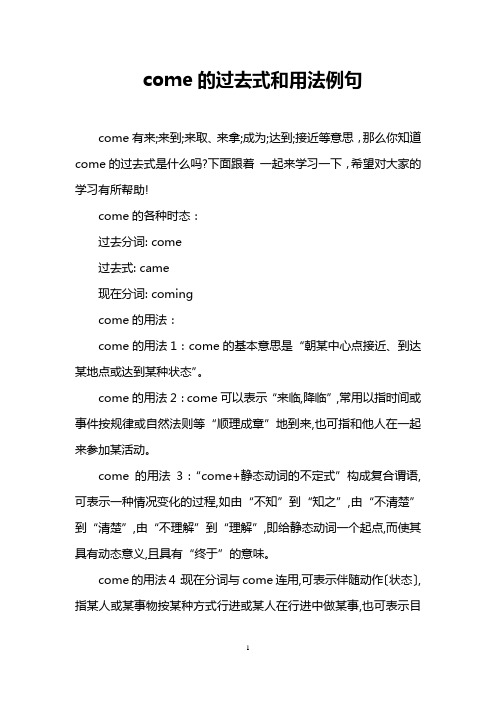
come的过去式和用法例句come有来;来到;来取、来拿;成为;达到;接近等意思,那么你知道come的过去式是什么吗?下面跟着一起来学习一下,希望对大家的学习有所帮助!come的各种时态:过去分词: come过去式: came现在分词: comingcome的用法:come的用法1:come的基本意思是“朝某中心点接近、到达某地点或达到某种状态”。
come的用法2:come可以表示“来临,降临”,常用以指时间或事件按规律或自然法则等“顺理成章”地到来,也可指和他人在一起来参加某活动。
come的用法3:“come+静态动词的不定式”构成复合谓语,可表示一种情况变化的过程,如由“不知”到“知之”,由“不清楚”到“清楚”,由“不理解”到“理解”,即给静态动词一个起点,而使其具有动态意义,且具有“终于”的意味。
come的用法4:现在分词与come连用,可表示伴随动作〔状态〕,指某人或某事物按某种方式行进或某人在行进中做某事,也可表示目的。
come的用法5:come在祈使句中一般不接动词不定式表示目的,而多用“come and to/ - v ”结构,在美式英语中,尤其是口语中and常可省略。
come的用法6:come可以用作系动词,接形容词作表语,意思是“变得,成为”,常常指好的事情。
come的用法7:come除在成语或谚语中外一般不用于被动结构,但其过去分词可和be连用构成系表结构。
come的用法8:come的进行时可表示按计划或安排即将发生的动作,这时一般有表示将来的时态或特定的上下文。
若表示过去将来的情况须用was/were coming,但come通常不用be going to 结构。
come的用法9:come是非延续性动词,不与表示一段时间的状语连用。
come的过去式例句:1. I was on my own and these fellows came along towards me.我正一个人走着,一些家伙朝我走过来。
come的用法及短语

Come的用法及短语短语:come down, come up with, come out, come in, come on, come off, come by, come to, come into play.1. The rain is coming down.雨开始下了.在美国的口语中, 美国人很喜欢用动词片语, 尤其是以get 或是come 开头的片语. 因为这类的动词除了表示出动作之外, 还说出了方向. 像这句话同样也可以说成, It's raining, 或是It's starting to rain. 但所表达的意思就不如come down 来的丰富. 这句话是有一次去看Football 时学的, 打到一半就下起雨来, 播报员就说, Tha rain is coming down.Come down 还有另一个重要的意思, 就是"下来楼下" 的意思. 比如说你去找一个住在五楼的朋友, 你在楼下的对讲机就可以问他, Do you want to come down? 你想不想下来啊?2. I came up with a good idea to that question.对于那个问题我有一个好主意.Come up with something 就是说突然想到一个主意或是其它事情, 光用come 表达不出那种跑出一个想法的意念, 所以要用come up. 常见的有come up with a solution, 或是come up with a new idea (见笔记四)3. Don't let the stuff come out.不要让里头的东西跑出来.记得有一次请老美来家里包水饺(What a lovely idea!!) 我一直想跟他们说不要让水饺里面的馅跑出来, 可是这个"跑出来" 要怎么讲就是一直想不出来, 总不会是run out 吧~~ 后来也是听他们说我才知道是用come out.Come out 也可以用在叫大家不要待在家里, 出来走走的意思, 例如我们宿舍每次都会贴出这样的布告, Come out for some foods. 或是Come out and have a good time with us! 所以你要打电话约人家出来, 也可以这样问, Do you wanna come out with me?Come out 也常用于新书的出版, 比如The new magazine just came out. 就是说新的杂志刚刚出版了. 另外若是讲到数学计算时, 老美也常用come out 来表示结果是多少, 例如你可以说, The total comes out to be forty-five.在同性恋的用语中, come out 有一个很特别的意思, 就是"出柜" 意思, 这个出柜指的是什么呢? 就是说同性恋公开自己是同性恋的身份啦. 例如, I am so surprised finally he came out! 他终于表明他是同性恋了.4. This is where the arguement comes in.这是争议的所在.有时在跟老美对话都突然会有那种, 咦, 这个字用的真好, 可是我就是用不出来. Come in 就是一个很好的例子. 有一次在跟一个老美谈学校的停车政策, 我们各有不同的观点, 我说, We need to build more parking decks. 他就说, Ok, this is where the arguement comes in, 然后才blah blah blah. 又讲了他的观点. 他的观点是什么不重要, 重要的是他在这里用了一个我觉的很棒的comes in 片语.Comes in 也常指新官上任喔! 例如我们学校最新来了一个新的校长, 你就可以这么说, A new president comes in.5. Come on!拜托喔~Come on 是个几乎每天都会听到个片语啦~ 但是不同的语气跟不同的场合有不同的意思. 例如在大热天你看到人家穿了一件毛衣, 你就可以说come on, dude~ 就是说大哥, 拜托你喔. (有点受不了人家的意思) 或是跟同学约好了五点出门, 结果他四点五十九分了, 你也可以催他, Come on, it's five already.Come on 也可以当作叫人家过来的意思, 例如你开车在路上看到同学迎面走来, 你就可以说, Come on, I'll give you a ride.6. The ball doesn't come off the net.这个球挂在网上掉不下来.以前在台湾打排球都是在水泥地上打, 可是来到美国, 我发现他们更喜爱沙滩排球或是草地排球(拿一个活动的网子, 在草地上一挂就玩起来了) 玩的很随兴很自在, 这通常也是party 的一个重要部份. Come off 简而言之就是二个原来在一起的东西分开的意思, 如油漆剥落, 如The paint comes off gradually. 或是球被球棒击中, The ball comes off the bat.7. I hope someone comes by and picks us up.我希望有人经过然后让我们搭便车.有一次大热天跟一个美国的朋友走在柏油路上, 他大概是被晒昏了吧. 居然开始作起白日梦起来, I hope someone come by and pick us up. 结果呢? 当然是没有人会理我们的啦, 还是要自己走回家. Come by 算是常见的片语, 就是从旁边经过的意思.8. We haven't come to a conclusion yet.我们还没有得到结论.Come to 常可以见到在这样的句子中, 如得出解答(come to a solution) 或是得到结论(conclusion) 和come up with 不同的是, come to 指的通常是最终的结果, 而come up with 只是想到某个想法而已.Come to 也常用于来到某个地方, 例如You will come to a stop sign if you keep straight. 如果你直走的话, 你就会到一个stop sign.9. This factor doesn't come into play in this case.这个因素在这里不起任何作用.Come into 后面可以加一个名词来表达不同的意思. 如例句中所讲的come into play 就老师上课时喜欢用的片语之一. Come into effect 跟come into play 很类似, 所以这句话也可以说成, This factor doesn't come into effect in this case.词性:不及物动词vi.1.来;来到Could you come (to) see me tomorrow?你明天能来看我吗?Come and look at the picture.过来看看这幅画。
关于come的用法

关于come的用法一、come的基本用法come是一个常见的英语动词,有多种用法和含义。
在不同的场景中,它可以表示移动、到达、发生或者存在等。
下面将介绍come的一些基本用法。
1. 表示移动和到达come常用来描述人或物体从某个地方移动向另一个地方,并且已经到达目标地点。
例如:- Mary is coming to the party tonight. (Mary今晚要来参加派对。
)- The train will come to the station in five minutes. (火车将在五分钟后到达车站。
)2. 表示发生或存在come也可用于表示某件事情的发生或存在。
例如:- Winter has come, and it's getting colder every day. (冬天来了,而且每天都越来越冷了。
)- A time will come when we have to make difficult decisions. (总有一天我们必须做出艰难的决定。
)3. 表示变得come还可以表示某种状态或性质的改变。
例如:- The weather has come nice today. (今天的天气变好了。
)- She has come a long way in her career. (她在职业道路上走出了很远的距离。
)二、常见短语和搭配除了基本用法之外,come还有许多常见短语和搭配,下面将列举几个常见的。
1. come up (with)表示提出(想法、解决方案等),或突然想起某事。
例如:- She came up with a brilliant idea for the project. (她为这个项目提出了一个绝妙的想法。
)- I can't come up with his name right now, but I'll remember it later. (我现在想不起他的名字,但我会记住的。
come的用法意思是什么及例句
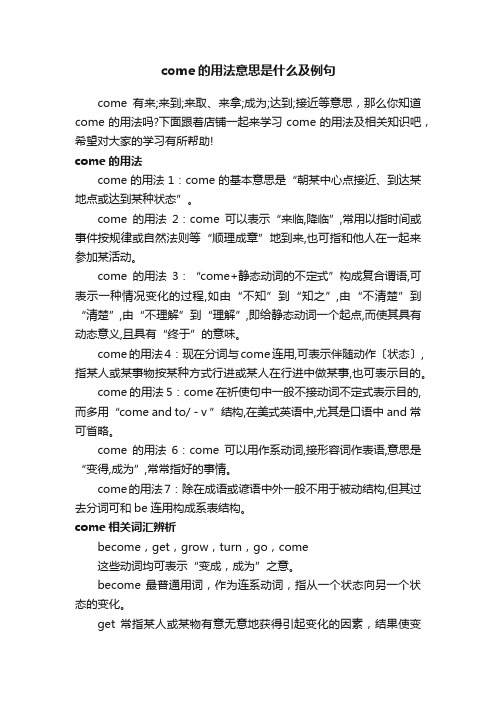
come的用法意思是什么及例句come有来;来到;来取、来拿;成为;达到;接近等意思,那么你知道come的用法吗?下面跟着店铺一起来学习come的用法及相关知识吧,希望对大家的学习有所帮助!come的用法come的用法1:come的基本意思是“朝某中心点接近、到达某地点或达到某种状态”。
come的用法2:come可以表示“来临,降临”,常用以指时间或事件按规律或自然法则等“顺理成章”地到来,也可指和他人在一起来参加某活动。
come的用法3:“come+静态动词的不定式”构成复合谓语,可表示一种情况变化的过程,如由“不知”到“知之”,由“不清楚”到“清楚”,由“不理解”到“理解”,即给静态动词一个起点,而使其具有动态意义,且具有“终于”的意味。
come的用法4:现在分词与come连用,可表示伴随动作〔状态〕,指某人或某事物按某种方式行进或某人在行进中做某事,也可表示目的。
come的用法5:come在祈使句中一般不接动词不定式表示目的,而多用“come and to/ - v ”结构,在美式英语中,尤其是口语中and常可省略。
come的用法6:come可以用作系动词,接形容词作表语,意思是“变得,成为”,常常指好的事情。
come的用法7:除在成语或谚语中外一般不用于被动结构,但其过去分词可和be连用构成系表结构。
come相关词汇辨析become,get,grow,turn,go,come这些动词均可表示“变成,成为”之意。
become 最普通用词,作为连系动词,指从一个状态向另一个状态的变化。
get 常指某人或某物有意无意地获得引起变化的因素,结果使变成另一状态。
grow 常指逐渐地变成新状态,强调渐变的过程。
turn 侧重指变得与原来截然不同,有时含贬义。
go 作为连系动词,通常与形容词连用,指进入某种状态,从而发生变化,多指不好的状态。
come 侧重变化的经过或过程,多用于不良情况。
come的用法例句1. We'll go to a meeting in Birmingham and come straight back.我们将去伯明翰参加会议,然后马上回来。
有关come的用法
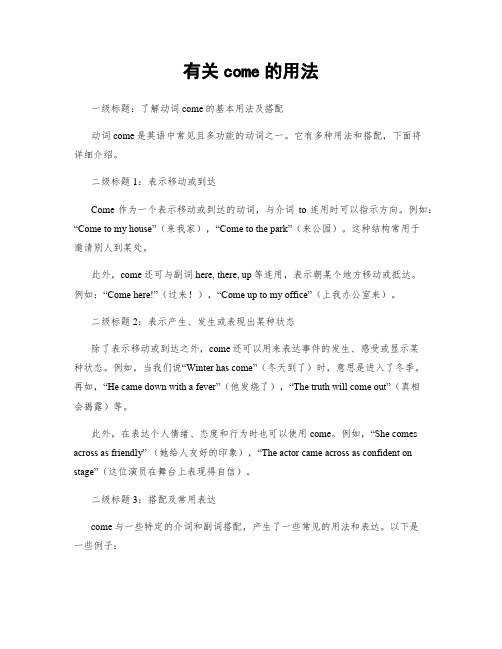
有关come的用法一级标题:了解动词come的基本用法及搭配动词come是英语中常见且多功能的动词之一。
它有多种用法和搭配,下面将详细介绍。
二级标题1:表示移动或到达Come作为一个表示移动或到达的动词,与介词to连用时可以指示方向。
例如:“Come to my house”(来我家),“Come to the park”(来公园)。
这种结构常用于邀请别人到某处。
此外,come还可与副词here, there, up等连用,表示朝某个地方移动或抵达。
例如:“Come here!”(过来!),“Come up to my office”(上我办公室来)。
二级标题2:表示产生、发生或表现出某种状态除了表示移动或到达之外,come还可以用来表达事件的发生、感受或显示某种状态。
例如,当我们说“Winter has come”(冬天到了)时,意思是进入了冬季。
再如,“He came down with a fever”(他发烧了),“The truth will come out”(真相会揭露)等。
此外,在表达个人情绪、态度和行为时也可以使用come。
例如,“She com es across as friendly” (她给人友好的印象),“The actor came across as confident on stage”(这位演员在舞台上表现得自信)。
二级标题3:搭配及常用表达come与一些特定的介词和副词搭配,产生了一些常见的用法和表达。
以下是一些例子:1. come across: 意为“偶然遇到”,可以指机会或巧合。
“I came across an old friend at the supermarket”(在超市里我偶然遇到一个老朋友)。
2. come up with: 意为“提出、找到(想法或解决办法)”。
例如,“He came up with a brilliant idea for the project”(他为这个项目提出了一个很棒的主意)。
come的短语用法
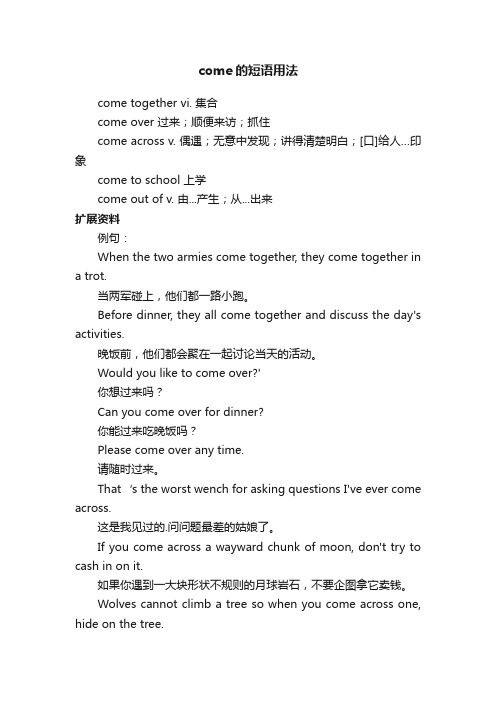
come的短语用法come together vi. 集合come over 过来;顺便来访;抓住come across v. 偶遇;无意中发现;讲得清楚明白;[口]给人…印象come to school 上学come out of v. 由...产生;从...出来扩展资料例句:When the two armies come together, they come together in a trot.当两军碰上,他们都一路小跑。
Before dinner, they all come together and discuss the day's activities.晚饭前,他们都会聚在一起讨论当天的活动。
Would you like to come over?'你想过来吗?Can you come over for dinner?你能过来吃晚饭吗?Please come over any time.请随时过来。
That‘s the worst wench for asking questions I've ever come across.这是我见过的.问问题最差的姑娘了。
If you come across a wayward chunk of moon, don't try to cash in on it.如果你遇到一大块形状不规则的月球岩石,不要企图拿它卖钱。
Wolves cannot climb a tree so when you come across one, hide on the tree.狼不会爬树,所以当你遇到一只时,躲到树上。
Why not come to school earlier?你为什么不早点儿来学校呢?They come to school by bus.他们是坐公车上学吗?When do you come to school?你什么时候到学校?。
系动词come的用法
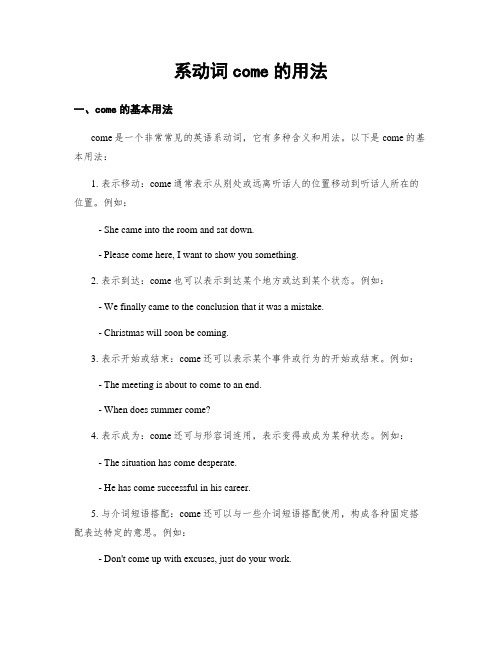
系动词come的用法一、come的基本用法come是一个非常常见的英语系动词,它有多种含义和用法。
以下是come的基本用法:1. 表示移动:come通常表示从别处或远离听话人的位置移动到听话人所在的位置。
例如:- She came into the room and sat down.- Please come here, I want to show you something.2. 表示到达:come也可以表示到达某个地方或达到某个状态。
例如:- We finally came to the conclusion that it was a mistake.- Christmas will soon be coming.3. 表示开始或结束:come还可以表示某个事件或行为的开始或结束。
例如:- The meeting is about to come to an end.- When does summer come?4. 表示成为:come还可与形容词连用,表示变得或成为某种状态。
例如:- The situation has come desperate.- He has come successful in his career.5. 与介词短语搭配:come还可以与一些介词短语搭配使用,构成各种固定搭配表达特定的意思。
例如:- Don't come up with excuses, just do your work.- I can't believe this idea came from you!以上是come作为系动词时的基本用法和例句。
二、come与其他动词结合的表达方式除了作为系动词之外,come还可以与其他动词结合使用,构成各种表达方式。
以下是一些常见的表达方式:1. come up:意为“出现”或“提出”,常用于会议、讨论和计划等场景。
例如:- He came up with a brilliant idea for the project.- The topic of the next meeting hasn't come up yet.2. come across:意为“偶然遇到”或“被理解”。
come的用法和短语

come的用法和短语一、come的基本用法1. 动词come是英语中常用的一个词汇,主要表示“来”的意思。
它可以作为及物动词或不及物动词使用。
2. 当come作为不及物动词时,常与介词to连用,表示朝向某地或某人的方向移动。
例如:- He came to my house yesterday.(昨天他来到了我家。
)- Please come to the meeting room for a discussion.(请到会议室进行讨论。
)3. 当come作为及物动词时,没有直接的宾语,常与副词或介词短语连用,表示到达某个地方或达成某种状态。
例如:- The bus will come soon.(公交车马上就要来了。
)- Summer has come, and the weather is getting hotter.(夏天已经来临,天气越来越热了。
)二、come的常见短语1. come across:偶然遇见- I came across an old friend on the street yesterday.(昨天我在街上偶然遇见了一个老朋友。
)2. come along:前进;走过来- Come along! We don't have much time left.(快点走吧!我们没多少时间了。
)3. come back:回来- She said she would come back tomorrow morning.(她说她明天早上回来。
)4. come down:下来;降落- The plane is coming down, get ready to land.(飞机正在降落,准备着陆。
)5. come forward:站出来;自告奋勇- Anyone with information about the incident is urged to come forward.(敦促有关这一事件的人站出来提供信息。
come的短语及用法
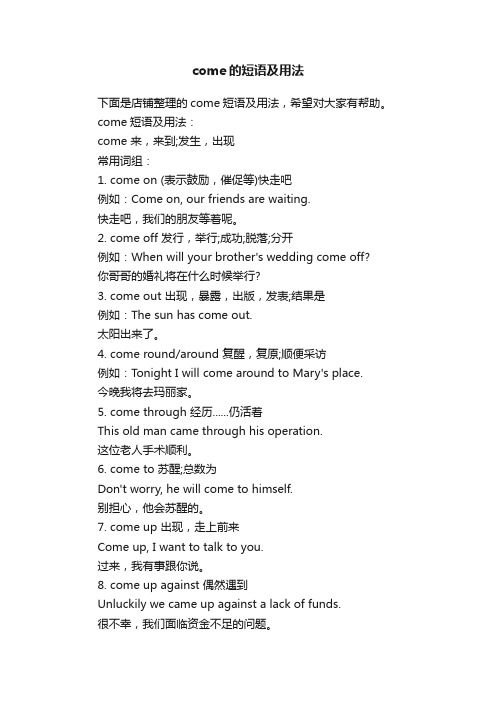
come的短语及用法下面是店铺整理的come短语及用法,希望对大家有帮助。
come短语及用法:come 来,来到;发生,出现常用词组:1. come on (表示鼓励,催促等)快走吧例如:Come on, our friends are waiting.快走吧,我们的朋友等着呢。
2. come off 发行,举行;成功;脱落;分开例如:When will your brother's wedding come off?你哥哥的婚礼将在什么时候举行?3. come out 出现,暴露,出版,发表;结果是例如:The sun has come out.太阳出来了。
4. come round/around 复醒,复原;顺便采访例如:Tonight I will come around to Mary's place.今晚我将去玛丽家。
5. come through 经历......仍活着This old man came through his operation.这位老人手术顺利。
6. come to 苏醒;总数为Don't worry, he will come to himself.别担心,他会苏醒的。
7. come up 出现,走上前来Come up, I want to talk to you.过来,我有事跟你说。
8. come up against 偶然遇到Unluckily we came up against a lack of funds.很不幸,我们面临资金不足的问题。
9. come up to 等于,比得上The new products don't come up to the previous one. 新产品质量比不上以前的产品质量。
10. come up with 提出,提供They have come up with a good idea.他们提出了一个好主意。
come的用法及短语

短语:come down, come up with, come out, come in, come on, come off, come by, come to, come into play.1. The rain is coming down.雨开始下了.在美国的口语中, 美国人很喜欢用动词片语, 尤其是以get 或是come 开头的片语. 因为这类的动词除了表示出动作之外, 还说出了方向. 像这句话同样也可以说成, It's raining, 或是It's starting to rain. 但所表达的意思就不如come down 来的丰富. 这句话是有一次去看Football 时学的, 打到一半就下起雨来, 播报员就说, Tha rain is coming down.Come down 还有另一个重要的意思, 就是"下来楼下" 的意思. 比如说你去找一个住在五楼的朋友, 你在楼下的对讲机就可以问他, Do you want to come down? 你想不想下来啊?2. I came up with a good idea to that question.对于那个问题我有一个好主意.Come up with something 就是说突然想到一个主意或是其它事情, 光用come 表达不出那种跑出一个想法的意念, 所以要用come up. 常见的有come up with a solution, 或是come up with a new idea (见笔记四)3. Don't let the stuff come out.不要让里头的东西跑出来.记得有一次请老美来家里包水饺(What a lovely idea!!) 我一直想跟他们说不要让水饺里面的馅跑出来, 可是这个"跑出来" 要怎么讲就是一直想不出来, 总不会是run out 吧~~ 后来也是听他们说我才知道是用come out.Come out 也可以用在叫大家不要待在家里, 出来走走的意思, 例如我们宿舍每次都会贴出这样的布告, Come out for some foods. 或是Come out and have a good time with us! 所以你要打电话约人家出来, 也可以这样问, Do you wanna come out with me?Come out 也常用于新书的出版, 比如The new magazine just came out. 就是说新的杂志刚刚出版了. 另外若是讲到数学计算时, 老美也常用come out 来表示结果是多少, 例如你可以说, The total comes out to be forty-five.在同性恋的用语中, come out 有一个很特别的意思, 就是"出柜" 意思, 这个出柜指的是什么呢? 就是说同性恋公开自己是同性恋的身份啦. 例如, I am so surprised finally he came out! 他终于表明他是同性恋了.4. This is where the arguement comes in.这是争议的所在.有时在跟老美对话都突然会有那种, 咦, 这个字用的真好, 可是我就是用不出来. Come in 就是一个很好的例子. 有一次在跟一个老美谈学校的停车政策, 我们各有不同的观点, 我说, We need to build more parking decks. 他就说, Ok, this is where the arguement comes in, 然后才blah blah blah. 又讲了他的观点. 他的观点是什么不重要, 重要的是他在这里用了一个我觉的很棒的comes in 片语.Comes in 也常指新官上任喔! 例如我们学校最新来了一个新的校长, 你就可以这么说, A new president comes in.5. Come on!拜托喔~Come on 是个几乎每天都会听到个片语啦~ 但是不同的语气跟不同的场合有不同的意思. 例如在大热天你看到人家穿了一件毛衣, 你就可以说come on, dude~ 就是说大哥, 拜托你喔. (有点受不了人家的意思) 或是跟同学约好了五点出门, 结果他四点五十九分了, 你也可以催他, Come on, it's five already.Come on 也可以当作叫人家过来的意思, 例如你开车在路上看到同学迎面走来, 你就可以说, Come on, I'll give you a ride.6. The ball doesn't come off the net.这个球挂在网上掉不下来.以前在台湾打排球都是在水泥地上打, 可是来到美国, 我发现他们更喜爱沙滩排球或是草地排球(拿一个活动的网子, 在草地上一挂就玩起来了) 玩的很随兴很自在, 这通常也是party 的一个重要部份. Come off 简而言之就是二个原来在一起的东西分开的意思, 如油漆剥落, 如The paint comes off gradually. 或是球被球棒击中, The ball comes off the bat.7. I hope someone comes by and picks us up.我希望有人经过然后让我们搭便车.有一次大热天跟一个美国的朋友走在柏油路上, 他大概是被晒昏了吧. 居然开始作起白日梦起来, I hope someone come by and pick us up. 结果呢? 当然是没有人会理我们的啦,还是要自己走回家. Come by 算是常见的片语, 就是从旁边经过的意思.8. We haven't come to a conclusion yet.我们还没有得到结论.Come to 常可以见到在这样的句子中, 如得出解答(come to a solution) 或是得到结论(conclusion) 和come up with 不同的是, come to 指的通常是最终的结果, 而come up with 只是想到某个想法而已.Come to 也常用于来到某个地方, 例如You will come to a stop sign if you keep straight. 如果你直走的话, 你就会到一个stop sign.9. This factor doesn't come into play in this case.这个因素在这里不起任何作用.Come into 后面可以加一个名词来表达不同的意思. 如例句中所讲的come into play 就老师上课时喜欢用的片语之一. Come into effect 跟come into play 很类似, 所以这句话也可以说成, This factor doesn't come into effect in this case.词性:不及物动词vi.1.来;来到Could you come (to) see me tomorrow?你明天能来看我吗?Come and look at the picture.过来看看这幅画。
come的详细用法

MEANINGS 义项1.MOVE TOWARDS SB/STH 朝某人/某物移动来;来到;降临•Let me know when they come. 他们来了就告诉我。
[+ in/into/out of etc]•There was a knock on the door and a young woman came into the room. 有人敲了一下门,然后一个年轻女人进了房间。
[+ to/towards]•I could see a figure coming towards me. 我看到有个人影向我走来。
[+ across/down/up etc]•As they came down the track, the car skidded. 他们的汽车在小路上行驶时打滑了。
come to do sth•I’ve come to see Philip. 我来看看菲利普。
come and do sth•I’ll come and help you move the rest of the boxes. 我会来帮你搬其余的箱子。
come running/flying/speeding etc•Jess came flying round the corner and banged straight into me. 杰斯从拐角处飞跑过来,和我撞了个满怀。
come to dinner/lunch•What day are your folks coming to dinner" 你爸妈哪天过来吃饭?here comes sb/sth (=used to say that someone or something is coming towards you)某人/某物来了•Ah, here comes the bus at last! 啊,公共汽车终于来了!2.GO WITH SB 与某人同行•We’re going for a drink this evening. Would you like to come" 今晚我们打算去喝酒,你愿意一起去吗?[+ with]•I asked Rosie if she’d like to come with us. 我问了罗茜是否愿意和我们一起去。
come短语及详细用法
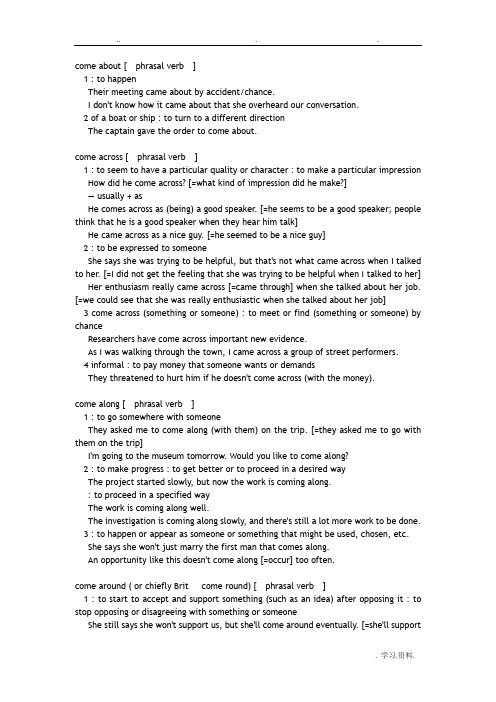
come about [ phrasal verb ]1 : to happenTheir meeting came about by accident/chance.I don't know how it came about that she overheard our conversation.2 of a boat or ship : to turn to a different directionThe captain gave the order to come about.come across [ phrasal verb ]1 : to seem to have a particular quality or character : to make a particular impressionHow did he come across? [=what kind of impression did he make?]— usually + asHe comes across as (being) a good speaker. [=he seems to be a good speaker; people think that he is a good speaker when they hear him talk]He came across as a nice guy. [=he seemed to be a nice guy]2 : to be expressed to someoneShe says she was trying to be helpful, but that's not what came across when I talked to her. [=I did not get the feeling that she was trying to be helpful when I talked to her] Her enthusiasm really came across [=came through] when she talked about her job. [=we could see that she was really enthusiastic when she talked about her job]3 come across (something or someone) : to meet or find (something or someone) by chanceResearchers have come across important new evidence.As I was walking through the town, I came across a group of street performers.4 informal : to pay money that someone wants or demandsThey threatened to hurt him if he doesn't come across (with the money).come along [ phrasal verb ]1 : to go somewhere with someoneThey asked me to come along (with them) on the trip. [=they asked me to go with them on the trip]I'm going to the museum tomorrow. Would you like to come along?2 : to make progress : to get better or to proceed in a desired wayThe project started slowly, but now the work is coming along.: to proceed in a specified wayThe work is coming along well.The investigation is coming along slowly, and there's still a lot more work to be done.3 : to happen or appear as someone or something that might be used, chosen, etc.She says she won't just marry the first man that comes along.An opportunity like this doesn't come along [=occur] too often.come around ( or chiefly Brit come round) [ phrasal verb ]1 : to start to accept and support something (such as an idea) after opposing it : to stop opposing or disagreeing with something or someoneShe still says she won't support us, but she'll come around eventually. [=she'll supportus eventually]— often + toShe'll come around to our side eventually.People are starting to come around to the idea.2 : to become consciousHe took a bad fall and knocked himself out. When he came around [=woke up, came to], he didn't remember what had happened.3 : to go to visit someoneWhy don't you come around [=come over] (to my house) after work today?4 : to occur in the usual way as time passesI always feel a little sad when the end of the school year comes around.— see also what goes around comes around at go, 15 of a boat or ship : to turn to a different directionThe sailboat came around [=came about] and began to head east.come at [ phrasal verb ]1 come at (someone)1 a : to move toward (someone) in a threatening or aggressive wayThey kept coming at me.1 b : to be directed at or toward (someone)The questions kept coming at him so quickly that he didn't know how to respond to them.2 come at (something) : to begin to deal with or think about (something)We need to come at [=approach] these problems from a different angle.come back [ phrasal verb ]1 : to return to a placeI hope you'll come back and see us again soon.— sometimes used figurativelya decision that may come back to haunt us [=a decision that may cause problems for us in the future]2 a : to return to a former good condition : to become strong, successful, or effective again after a time of weakness, failure, etc.It can be difficult for an athlete to come back [=recover] from an injury like this.a species that was nearly extinct but that has been coming back2 b : to become popular or fashionable againShort skirts were out of fashion for many years, but now they're coming back.2 c : to be successful in a game, sport, etc., after being behindThe team was trailing after the first half, but they came back and won in the second half.3 : to return to someone's memory— usually + toI had forgotten a lot of what I learned about music, but it's all coming back to me now. [=I am beginning to remember it now]4 : to make a reply or response— usually + withWhen questioned about his involvement, he came back with an angry denial.come between [ phrasal verb ]come between (people or groups) : to cause disagreement between (people or groups) We shouldn't let these problems come between e down [ phrasal verb ]1 a : to move or fall downwardThe crowd erupted in applause as the curtain came down.One of the tree's branches came down during the storm.1 b of rain, snow, etc. : to fall from the skyShe stood at the window, watching the rain come down.The rain was coming down in sheets. [=it was raining very heavily]2 : to go to a lower levelStock prices have continued to come down [=fall] this week. = Stocks have continued to come down in price this week.It's sad to see how he has come down in the world. [=how he has fallen to a lower position or status after being wealthy, successful, etc.]— see also comedown3 : to decide or say in an official or public way that you support or oppose someone or somethingThe committee came down in favor of the proposal. = The committee came down on the side of the proposal. [=the committee approved the proposal]Some of his former supporters have come down against him.4◇An announcement or decision that comes down is an announcement or decision from someone who has power or authority.Word came down that the strike was over.The decision came down in his favor.5◇Something that comes down from the past is something that has existed for a very long time.This is a story that has come down from ancient times.6 informal : to stop feeling the effect of an illegal drug : to stop being high on a drugan addict who is coming down from heroincome by [ phrasal verb ]1 : to make a visit to someoneWhy don't you come by [=come over] for a while after dinner?2 come by (something) : to get or acquire (something)I asked him how he came by the money, but he wouldn't tell me.A good job is hard to come by. [=it's hard to get a good job]come down [ phrasal verb ]1 a : to move or fall downwardThe crowd erupted in applause as the curtain came down.One of the tree's branches came down during the storm.1 b of rain, snow, etc. : to fall from the skyShe stood at the window, watching the rain come down.The rain was coming down in sheets. [=it was raining very heavily]2 : to go to a lower levelStock prices have continued to come down [=fall] this week. = Stocks have continued to come down in price this week.It's sad to see how he has come down in the world. [=how he has fallen to a lower position or status after being wealthy, successful, etc.]— see also comedown3 : to decide or say in an official or public way that you support or oppose someone or somethingThe committee came down in favor of the proposal. = The committee came down on the side of the proposal. [=the committee approved the proposal]Some of his former supporters have come down against him.4◇An announcement or decision that comes down is an announcement or decision from someone who has power or authority.Word came down that the strike was over.The decision came down in his favor.5◇Something that comes down from the past is something that has existed for a very long time.This is a story that has come down from ancient times.6 informal : to stop feeling the effect of an illegal drug : to stop being high on a drugan addict who is coming down from heroincome down on [ phrasal verb ]1 come down on (someone) : to criticize or punish (someone)The governor has promised to come down hard on corrupt officials. [=to severely punish corrupt officials]Her boss came down on her pretty hard when she didn't finish the report on time.2 come down on (something) : to make a strong effort to stop or oppose (something)The governor has promised to come down hard on corruption.come down to [ phrasal verb ]come down to (something) : to have (something) as the most important partPeople talk about various reasons for the company's failure, but it all comes down to one thing: a lack of leadership.The election is going to come down to which candidate seems most trustworthy to the voters. [=the candidate who seems most trustworthy will win the election]It's nice to be rich, but when you come (right) down to it, it's more important to be healthy and happy.come down with [ phrasal verb ]come down with (an illness) : to begin to have or suffer from (an illness)She came down with [=contracted] measles.I think I may be coming down with [=getting, catching] a cold.come forward [ phrasal verb ]: to say openly or publicly that you are the person who should get something or who can do somethingNo one has yet come forward to claim the reward.Several people came forward to offer their assistance.come in [ phrasal verb ]1 a : to enter a placeWelcome. Please come in.1 b : to arrive at a placeThe store will have some exciting new products coming in next week.2 : to be receivedThe election results should start coming in soon. [=we should start receiving/getting the election results soon]The broadcast was coming in loud and clear. [=we could hear the broadcast very clearly]3 : to end a race or competition in a specified positionJoan won the race and her sister came in [=finished] second.He came in first/last.4 : to have a particular role or functionWe're going to need someone to help with the cooking, and that's where you come in. [=your job will be to help us with the cooking]5◇Something that comes in handy or (less commonly) comes in useful/helpful turns out to be useful when it is needed.A pocketknife can come in handy.A little extra money would come in useful right now.come in for [ phrasal verb ]come in for (something) : to get or be given (something unpleasant, such as criticism) : to be subjected to (something)The government's policies are coming in for increasing criticism. [=more people are beginning to criticize the government's policies]come into [ phrasal verb ]come into (something)1 : to enter (a place)Everyone watched her as she came into the room.2 : to get (something) as a possessionHe came into a fortune when he inherited his father's estate.3 : to be involved in (something)Deciding who to hire should be a business decision. You shouldn't allow personal feelings to come into it. [=you shouldn't allow personal feelings to affect your decision]come off [ phrasal verb ]1 come off or come off (something) : to stop being attached to somethingWhen I tried to pick up the suitcase, the handle came off. = The handle came off the suitcase.2 : to produce a desired result : to succeedHis plans to start his own business never came off.3 : to happenThe meeting came off as scheduled. [=the meeting happened when it was scheduled to happen]4 : to do or perform well or badlyShe came off well in the contest.He came off badly/poorly in the debate.5 : to seem to have a specified quality or character— usually + asHe's really just shy, but he comes off as a little arrogant. [=he seems a little arrogant] He came off as a stuffy old man.6 come off (something)6 a US : to have recently completed or recovered from (something)a company that is coming off a very successful yearan athlete who is coming off a serious injury6 b : to have recently stopped using (an illegal drug)an addict who is coming off heroin7 US, informal— used in phrases like where do you come off? to express anger or annoyance at what someone has said or doneWhere do you come off talking to me like that? [=you have no right to talk to me like that; how dare you talk to me like that?]I don't know where he comes off making those kinds of accusations. [=he has no right to make those kinds of accusations]come on [ phrasal verb ]1 a : to happen or progress as time passesDarkness came on rapidly/gradually [=it rapidly/gradually became dark] as the sun went down.1 b : to begin to happenRain came on toward noon. [=it began to rain when it was almost noon]I feel a headache coming on.It looks like it might be coming on to rain. [=it looks like it might start to rain soon] 2 a of an electrical machine, light, etc. : to begin to work or functionThe lights came on briefly and then went out again.2 b of a TV or radio program : to startThat program you like is coming on in a few minutes.3 informal3 a— used in speech to ask or urge someone to do something“I don't feel like going out tonight.” “Oh, come on! It'll do you good to get out of the house for a while.”“I don't think I can go any further.” “Come on! Y ou can do it if you keep trying!”3 b— used in speech to tell someone to hurry or to go fasterCome on, let's go.3 c— used in speech to express surprise, disbelief, etc.“I think she could win the election.” “Come on! She doesn't have a chance!”4 : to have or seem to have a certain quality or natureHe comes on [=comes across] as a conservative.come on to [ phrasal verb ]1 come on to (someone) informal : to show sexual interest in (someone) : to try to start a sexual relationship with (someone)She complained that her boss has been coming on to her.2 come on to (something) Brit : to start to talk about or deal with (something)We'll come on to [=come to, get to] that question later.come out [ phrasal verb ]1 : to become available : to begin to be produced or soldA new magazine is coming out next week.The book/movie comes out next month.2 a : to become obvious : to be clearly shownHis pride came out in his refusal to accept help. [=his refusal to accept help showed his pride]2 b : to become knownThe truth finally came out. [=people finally learned the truth]It came out that he had known about these problems all along, but he hadn't said anything.3 : to say something openlyWhy don't you just come out and say what you really think?4 : to say publicly that you support or oppose someone or somethingShe came out in favor of the proposal.Some of his former supporters have come out against him.5 : to say openly that you are a homosexualMany gay entertainers have been reluctant to come out.Last year she came out (as a lesbian) to her parents. [=she told her parents that she isa lesbian]6 a : to appear after being hiddenThe rain stopped and the sun/moon/stars came out as the clouds cleared away.: to appear in the openanimals that only come out at night6 b of a flower : to open : to blossomin the spring, when the flowers are beginning to come out (in bloom)7 a : to end or finish in a specified wayHow did the game come out? [=turn out] [=who won the game?]Everything came out [=ended up, turned out] all right.She expects to come out ahead in the end.He's confident that he'll come out a winner.He's confident that he'll come out on top [=that he'll win] when all the votes have been counted.7 b of a photograph : to produce a good pictureThose pictures I took at the game yesterday didn't come out.7 c— used to describe the quality that something has when it is finishedThe picture came out blurry.The brownies came out a little too dry.8 : to be said, expressed, or understood in a particular wayThat's not what I meant to say. It didn't come out right.He was trying to make a joke, but it came out wrong.come out with [ phrasal verb ]come out with (something)1 : to say or express (something, such as an idea)She came out with a new proposal.He's always saying ridiculous things. You never know what he'll come out with next.Why don't you just come out with it and say what you really think?2 : to publish or produce (something that will be sold to the public)a publisher that is coming out with a new series of children's booksa car company that is coming out with several new models next yearcome over [ phrasal verb ]1 : to make a social visit to someoneWhy don't you come over [=come around] (to my place) after work?2 : to change from one side to the other in a disagreement, competition, etc.— usually + toI've been trying to persuade her to come over to our side, but I haven't convinced her yet.3 Brit, informal : becomeHe suddenly came over all bashful. [=he suddenly became very bashful]4 come over (someone) : to affect (someone) in a sudden and strong wayA sudden feeling of dread came over me. [=I felt a sudden feeling of dread]He's behaving so strangely. I don't know what's come over him lately. [=I don't know what has caused him to behave so strangely]come through [ phrasal verb ]1 : to succeed in doing something : to do what is needed or expectedan athlete who is known for coming through in the clutch“I managed to get the tickets.” “Great! I knew you'd come through.”2 a : to be received and understoodThe message came through loud and clear.The signal wasn't coming through. [=we weren't receiving the signal]2 b : to be expressed to someoneHer enthusiasm really came through [=came across] when she talked about her job. [=we could see that she was really enthusiastic when she talked about her job]3 : to be given or made official in a formal and final wayWe're still waiting for approval of our loan application to come through.4 come through (something) : to have the experience of living through (something)It was a very difficult illness, but he came through it in pretty good shape.come to [ phrasal verb ]1 : to become consciousHe took a bad fall and knocked himself out. When he came to [=woke up, came around], he didn't remember what had happened.2 come to (something)2 a : to reach (a place) while travelingWe came to a fork in the road.2 b : to reach (a particular point or step in a process)Deciding to buy a new car was easy. Now we come to the hard part: finding the money.I can't believe that it has come to this.2 c : to approach or reach (a specified condition)The water came slowly to a boil. [=the water slowly began to boil]The project suddenly came to a stop/halt. [=the project suddenly stopped]The work has finally come to an end. [=has finally ended]— see also come to a bad end at end, 12 d : to result in (something)— usually used in negative statementsHis ambitious plans never came to much.She talked about learning to fly, but it all came to nothing in the end. [=she never did learn to fly]2 e : to make or reach (something, such as a decision or an agreement) after thinkingor talkingThe two sides finally came to an agreement/understanding after many hours of discussion.I've been thinking about what to do next, and I've come to a decision. [=I've made a decision]I've come to the conclusion [=I've decided] that we need to try a different method. 3◇People say that they don't know what the world is coming to or they ask What is the world coming to? when they are shocked or disgusted by something that has happened in the world.I don't know what the world is coming to when so many poor children have to go to bed hungry every night.4◇The phrase when it comes to is used to identify the specific topic that is being talked about.When it comes to playing chess, he's the best I know.5◇The phrase if it comes to that means “if that is necessary.”I'm willing to pay more money if it comes to that.6 come to (an amount) : to produce (an amount) when added togetherThe bill came to [=amounted to] 10 dollars.7 come to (someone) : to be thought of by (someone) : to occur to (someone)The answer suddenly came to me. [=I suddenly thought of the answer]8◇Something that is coming to you is something that is owed to you.I have another dollar coming to me. [=I am owed another dollar]He wants all the credit that's coming to him. [=he wants all the credit that he deserves]◇If you get what's coming to you, you get the punishment that you deserve.He's a dirty cheat, and I'm going to see that he gets what coming to him.◇If you have it coming (to you) you deserve to get something bad, such as punishment.I'm not sorry to hear that he lost his job. He had it coming.come under [ phrasal verb ]come under (something)1 : to be subjected to (something)The troops were resting when they suddenly came under attack. [=when they were suddenly attacked]His policies have been coming under attack/criticism/fire from conservatives. [=conservatives have been attacking/criticizing his policies]Many people feel that their civil rights are coming under threat. [=are being threatened]Some of the governor's recent proposals are now coming under increased scrutiny. [=people are now looking more closely and critically at the proposals] The school is coming under pressure to change its policies.2 : to be affected, controlled, or influenced by (something)an area that has come under the control of rebel forces [=an area that is now controlled by rebel forces]He was 30 years old when he first came under the care of a psychiatrist. [=when he first began to be treated by a psychiatrist]Many young people have come under his influence. [=many young people have been influenced by him]areas that come under his authority3— used to identify the group or category that something belongs toThese matters come under the heading of classified information.come up [ phrasal verb ]1 : to move near to someone or something : to approach someone or somethingHe came (right) up (to me) and introduced himself.2 a : to be mentioned or thought ofThat issue never came up. [=arose]A question has come up about the budget.I was surprised when his name came up as a possible candidate for the job.2 b : to occur in usually a sudden or unexpected wayShe seems to be ready to deal with any problem that may come up. [=arise]Something has come up and I won't be able to attend the meeting.We need to be ready to take action if an opportunity comes up.3 of the sun or moon : to become visible in the sky : to riseShe was already awake when the sun came up.4 of a plant : to first appear above the groundin the spring, when the daffodils and tulips are coming up5 : to finish in a specified condition or stateI flipped the coin and it came up heads/tails.The shot came up short. [=the shot did not go far enough]6 : to move up in rank or statusan officer who came up from/through the ranks [=who started as an ordinary soldier and rose to become an officer]7◇Something that is coming up will happen soon or will appear soon.With the election coming up, both candidates are spending all their time on the campaign trail.Our interview with the mayor is coming (right) up after this commercial.“I'd like a turkey sandwich and a glass of lemonade, please.” “Coming right up!” [=the sandwich and lemonade will be served to you very quickly]1 : to move near to someone or something : to approach someone or somethingHe came (right) up (to me) and introduced himself.2 a : to be mentioned or thought ofThat issue never came up. [=arose]A question has come up about the budget.I was surprised when his name came up as a possible candidate for the job.2 b : to occur in usually a sudden or unexpected wayShe seems to be ready to deal with any problem that may come up. [=arise]Something has come up and I won't be able to attend the meeting.We need to be ready to take action if an opportunity comes up.3 of the sun or moon : to become visible in the sky : to riseShe was already awake when the sun came up.4 of a plant : to first appear above the groundin the spring, when the daffodils and tulips are coming up5 : to finish in a specified condition or stateI flipped the coin and it came up heads/tails.The shot came up short. [=the shot did not go far enough]6 : to move up in rank or statusan officer who came up from/through the ranks [=who started as an ordinary soldier and rose to become an officer]7◇Something that is coming up will happen soon or will appear soon.With the election coming up, both candidates are spending all their time on the campaign trail.Our interview with the mayor is coming (right) up after this commercial.“I'd like a turkey sandwich and a glass of lemonade, please.” “Coming right up!” [=the sandwich and lemonade will be served to you very quickly]come up against [ phrasal verb ]come up against (something) : to be stopped or slowed by (something)The proposal has come up against some opposition. [=there is some opposition to the proposal]come upon [ phrasal verb ]somewhat formal1 come upon (someone or something) : to meet or find (someone or something) by chanceAs they turned the corner, they came upon an unexpected scene.While researching the town's history, she came upon some surprising new information about its first mayor.2 come upon (someone) of a feeling : to affect (someone) suddenlyAn urge to travel suddenly came upon him. [=he suddenly felt an urge to travel]come up to (something) : to be as good as (something)The movie didn't come up to our expectations. [=was not as good as we expected it to be]come up with [ phrasal verb ]come up with (something) : to get or think of (something that is needed or wanted) We finally came up with a solution (to our problem).He came up with an interesting new method of improving the factory's efficiency.He'll be in a lot of trouble if he doesn't come up with the money he owes.。
come的用法和固定搭配

come的用法和固定搭配一、come的基本含义和用法(段落标题)come是一个常见的英语动词,意思是“来”。
无论是表示行动的起点或表达到达某一地点,还是用于描述事件或情况的发生,come都能准确地传达这一含义。
此外,come还有其他多样的用法和固定搭配,以下将详细介绍。
1. 行动的起点:come作为不及物动词时,用来表示行动的起点。
例如:She came into the room quietly.(她悄悄地走进了房间。
)另外,在口语中会常常听到"I'm coming!"这样的短语来表达回应或者即将出现。
2. 到达某地:当我们需要表达自己到达某个地方时,可以使用come来描述这一过程。
例如:The train is coming in five minutes.(火车将在五分钟内到站。
)Bring your umbrella, it's coming to rain.(带上你的雨伞吧,天要下雨了。
)3. 事件或情况发生:come也可用于描述事件或情况的发生。
例如:My birthday is coming soon!(我的生日快要到了!)The winter has come early this year.(今年冬天来得早。
)二、与名词搭配形成固定短语(段落标题)除了基本的用法外,come还具有一系列与名词搭配形成的固定短语。
1. come up with:这个短语意为“提出(想法、答案等)”,表示在某个情况下产生或提供某种解决方案。
例如:He always comes up with brilliant ideas.(他总是能提出一些绝妙的想法。
)2. come across:意为“偶然遇到”,用来描述无意中发现某人或某物。
例如:I came across an interesting book in the library yesterday.(昨天我在图书馆偶然发现了一本有趣的书。
以come开头的常用短语和用法
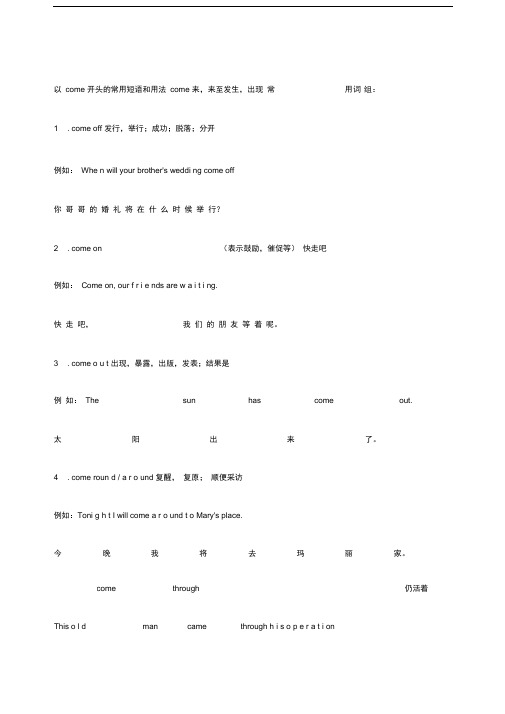
以come 开头的常用短语和用法come 来,来至发生,出现常用词组:1 . come off 发行,举行;成功;脱落;分开例如:Whe n will your brother's weddi ng come off你哥哥的婚礼将在什么时候举行?2 . come on (表示鼓励,催促等)快走吧例如:Come on, our f r i e nds are w a i t i ng.快走吧,我们的朋友等着呢。
3 . come o u t 出现,暴露,出版,发表;结果是例如:The sun has come out.太阳出来了。
4 . come roun d / a r o und 复醒,复原;顺便采访例如:Toni g h t I will come a r o und t o Mary's place.今晚我将去玛丽家。
come through 仍活着This o l d man came through h i s o p e r a t i on这位老人手术顺利。
6 . come to 苏醒;总数为Don't worry, h e will come t o himself.别担心,他会苏醒的。
7 . come up 出现,走上前来Come u p , I want t o talk t o you.过来,我有事跟你说。
8 . come u p a g a inst 偶然遇到Uni uckily w e came u p a g a i nst a lack o f fun d s .很不幸,我们面临资金不足的问题。
9 . come u p t o 等于,比得上The new products don't come u p t o t h e previous one.新产品质量比不上以前的产品质量。
1 0 . come u p with 提出,提供They have come u p with a good idea. 他们提出了一个好主意。
come的过去式和用法例句
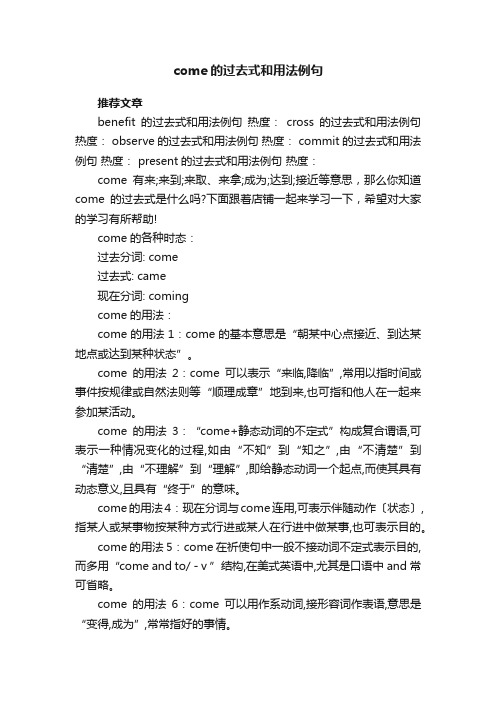
come的过去式和用法例句推荐文章benefit的过去式和用法例句热度:cross的过去式和用法例句热度: observe的过去式和用法例句热度: commit的过去式和用法例句热度: present的过去式和用法例句热度:come有来;来到;来取、来拿;成为;达到;接近等意思,那么你知道come的过去式是什么吗?下面跟着店铺一起来学习一下,希望对大家的学习有所帮助!come的各种时态:过去分词: come过去式: came现在分词: comingcome的用法:come的用法1:come的基本意思是“朝某中心点接近、到达某地点或达到某种状态”。
come的用法2:come可以表示“来临,降临”,常用以指时间或事件按规律或自然法则等“顺理成章”地到来,也可指和他人在一起来参加某活动。
come的用法3:“come+静态动词的不定式”构成复合谓语,可表示一种情况变化的过程,如由“不知”到“知之”,由“不清楚”到“清楚”,由“不理解”到“理解”,即给静态动词一个起点,而使其具有动态意义,且具有“终于”的意味。
come的用法4:现在分词与come连用,可表示伴随动作〔状态〕,指某人或某事物按某种方式行进或某人在行进中做某事,也可表示目的。
come的用法5:come在祈使句中一般不接动词不定式表示目的,而多用“come and to/ - v ”结构,在美式英语中,尤其是口语中and常可省略。
come的用法6:come可以用作系动词,接形容词作表语,意思是“变得,成为”,常常指好的事情。
come的用法7:come除在成语或谚语中外一般不用于被动结构,但其过去分词可和be连用构成系表结构。
come的用法8:come的进行时可表示按计划或安排即将发生的动作,这时一般有表示将来的时态或特定的上下文。
若表示过去将来的情况须用was/were coming,但come通常不用be going to结构。
come的用法9:come是非延续性动词,不与表示一段时间的状语连用。
- 1、下载文档前请自行甄别文档内容的完整性,平台不提供额外的编辑、内容补充、找答案等附加服务。
- 2、"仅部分预览"的文档,不可在线预览部分如存在完整性等问题,可反馈申请退款(可完整预览的文档不适用该条件!)。
- 3、如文档侵犯您的权益,请联系客服反馈,我们会尽快为您处理(人工客服工作时间:9:00-18:30)。
MEANINGS 义项1.MOVE TOWARDS SB/STH 朝某人/某物移动来;来到;来临•Let me know when they come。
他们来了就告诉我。
[+ in/into/out of etc]•There was a knock on the door and a young woman came into the room. 有人敲了一下门,然后一个年轻女人进了房间。
[+ to/towards]•I could see a figure coming towards me. 我看到有个人影向我走来。
[+ across/down/up etc]•As they came down the track, the car skidded. 他们的汽车在小路上行驶时打滑了。
come to do sth•I’ve come to see Philip。
我来看看菲利普。
come and do sth•I’ll come and help you move the rest of the boxes。
我会来帮你搬其余的箱子。
come running/flying/speeding etc•Jess came flying round the corner and banged straight into me。
杰斯从拐角处飞跑过来,和我撞了个满怀。
come to dinner/lunch•What day are your folks coming to dinner?你爸妈哪天过来吃饭?here comes sb/sth (=used to say that someone or something is coming towards you)某人/某物来了•Ah,here comes the bus at last! 啊,公共汽车终于来了!2。
GO WITH SB 与某人同行•We’re going for a drink this evening. Would you like to come?今晚我们打算去喝酒,你愿意一起去吗?[+ with]•I asked Rosie if she’d like to come with us. 我问了罗茜是否愿意和我们一起去。
[+ along]•It should be good fun. Why don’t you come along? 应该很好玩。
你也一起去怎么样?3.TRAVEL TO A PLACE 行至某地•Which way did you come?你从哪条路来的?•Have you come far (= travelled a long way ) today?今天你走了很长的路吗?•I’ve come a long way to see you. 我赶了很远的路来看你。
[+ through/across/by way of etc]•They came over the mountains in the north。
他们翻过北边的山来的.[+ from]•Legend has it that the tribe came from across the Pacific Ocean. 传说这个部落是从太平洋的那一边过来的。
come by car/train/bus etc•Will you be coming by train?你打算乘火车来吗?come 50/100 etc miles/kilometres•Some of the birds have come thousands of miles to winter here. 一些鸟飞了数千英里来这里过冬。
4。
POST 邮寄•A letter came for you this morning。
今天早晨有寄给你的一封信。
•The phone bill hasn’t come yet。
电话费账单还没寄到。
5。
〔时间或事件〕到来;发生•At last the day came for us to set off. 我们出发的日子终于来到了。
The moment had come for me to break the news to her. 是时候了,我应该把这消息告诉她了。
be/have yet to come(=used when something has not happened yet but will happen)还没到来•The most exciting part is yet to come。
最激动人心的一刻还没到来.6.[always + adv/prep] to reach a particular level or place够到,达到〔某一高度或位置〕[+ up/down]•She had blonde hair which came down to her waist. 她留着齐腰长的金发。
7.BE PRODUCED/SOLD 制造出/售出[always + adv/prep] 备有〔货〕,可提供[+ in]•This particular sofa comes in four different colours. 这种沙发有四种不同的颜色. •Cats come in many shapes and sizes. 猫科动物体形各异,大小也不一样.[+ with]•The computer comes complete with software and games。
这台电脑配有软件和游戏.8.[always + adv/prep]位于,处于〔某一位置〕[+ before/after]•P comes before Q in the alphabet。
字母表中P在Q之前。
come first/second etc•She came first in the 200 metres。
她在200米比赛中名列第一.e open/undone/loose etc松开,解开•His shoelace had come undone。
他的鞋带松了。
•The rope came loose. 绳子松开了。
e to do sth 开始感觉到某事;开始有某意见;偶然地做某事•He came to think of Italy as his home。
他开始把意大利看成自己的家了。
•I came to believe that he was innocent after all。
我开始相信他还是清白的。
•Can you tell me how the body came to be discovered?你能告诉我这具尸体是怎么发现的吗?come to be doing sth •I often wondered how I came to be living in such a place. 我常常在想,我怎么会住到这种地方来.e and go来去自由,来去随便•The students can come and go as they please. 学生可以来去自由.断断续续,时断时续•The pain comes and goes. 疼痛时断时续.12.take sth as it comes对某事随遇而安,对某事听天由命•We just take each year as it comes。
我们每年都是随遇而安。
•He takes life as it comes. 他对待生活的态度是听天由命。
13.have sth coming (to you)(你)活该承受某惩罚[恶果],(你)咎由自取•I do feel sorry for him, but I’m afraid he had it coming. 我的确为他感到难过,但恐怕他也是罪有应得。
14.as nice/as stupid etc as they come极好的/极蠢的等•My uncle Walter is as obstinate as they come. 我的叔叔沃尔特非常固执。
15。
for years/weeks/days etc to come在未来的很多年/周/天等里•This is a moment that will be remembered and celebrated for years to come. 这一时刻将永远被缅怀和纪念。
16。
i n years/days to come将来,未来•In years to come, some of the practices we take for granted now will seem quite barbaric。
到了将来,我们现在的一些被认为理所当然的做法会显得相当野蛮。
17.have come a long way有长足进步,有极大发展•Computer technology has come a long way since the 1970s. 电脑技术自20世纪70年代以来已经取得了长足的进步。
18。
come as a surprise/relief/blow etc (to sb)使(某人)惊奇/松一口气/受到打击等•The decision came as a great relief to us all. 这个决定让我们大家都松了一大口气。
•The news will come as no surprise to his colleagues. 他的同事对这个消息一点都不会感到惊奇。
19.c ome easily/naturally (to sb)(对某人而言)很容易/自然•Public speaking does not come easily to most people。
对大多数人来讲,公开演讲不是件容易的事。
e of age 成年,达到法定年龄•He’ll inherit the money when he comes of age. 他到了法定年龄就可以继承这笔钱。
发展到高级阶段,发展到成功的形式•Space technology didn’t really come of age until the 1950s. 空间技术直到20世纪50年代才真正趋于成熟。
e right out with sth/come right out and say sth坦言某事,直截了当地说出某事〔常指出人意料地〕•You came right out and told him? I don’t know how you dared!你直截了当地对他说了?我不懂你怎么敢这样!22。
